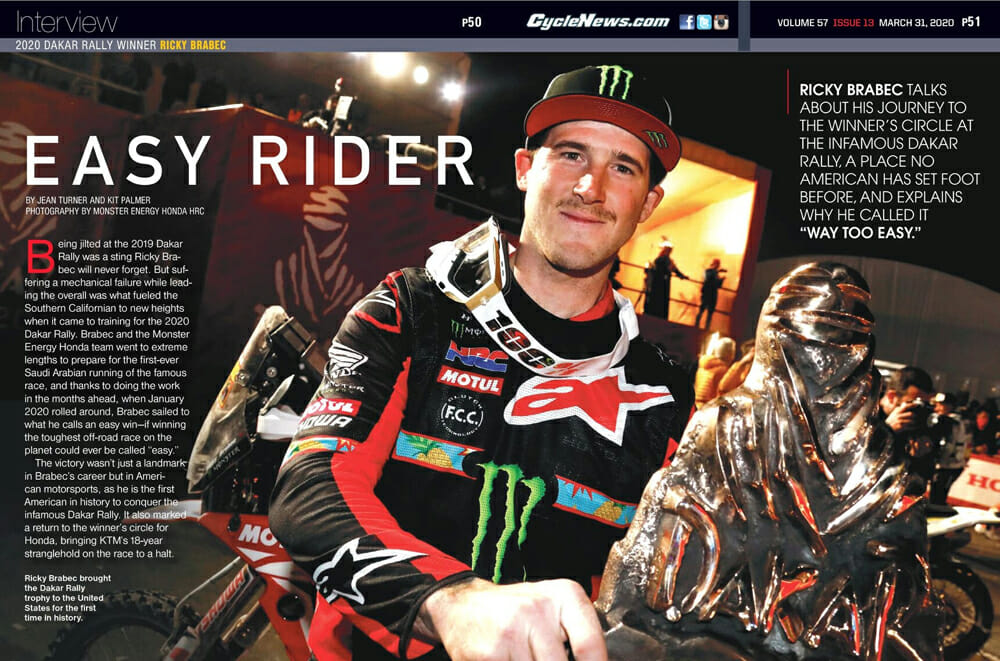Cycle News Staff | April 4, 2020
Ricky Brabec talks about his journey to the winner’s circle at the infamous Dakar Rally, a place no American has set foot before, and explains why he called it “way too easy.”
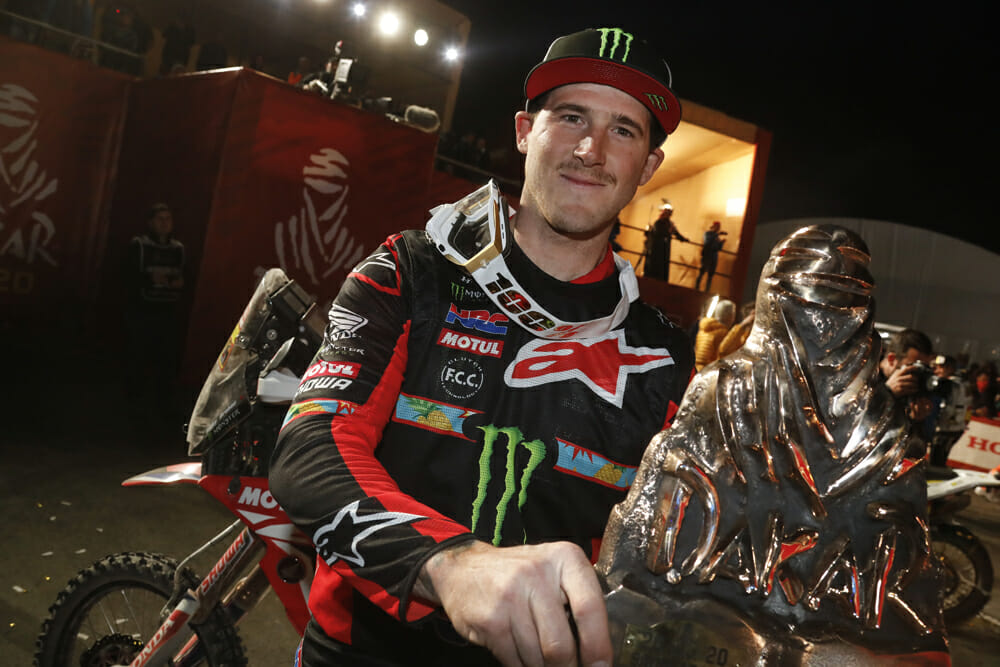 Ricky Brabec brought the Dakar Rally trophy to the United States for the first time in history.
Ricky Brabec brought the Dakar Rally trophy to the United States for the first time in history.
By Jean Turner and Kit Palmer
Photography by Monster Energy Honda HRC
Being jilted at the 2019 Dakar Rally was a sting Ricky Brabec will never forget. But suffering a mechanical failure while leading the overall was what fueled the Southern Californian to new heights when it came to training for the 2020 Dakar Rally. Brabec and the Monster Energy Honda team went to extreme lengths to prepare for the first-ever Saudi Arabian running of the famous race, and thanks to doing the work in the months ahead, when January 2020 rolled around, Brabec sailed to what he calls an easy win—if winning the toughest off-road race on the planet could ever be called “easy.”
The victory wasn’t just a landmark in Brabec’s career but in American motorsports, as he is the first American in history to conquer the infamous Dakar Rally. It also marked a return to the winner’s circle for Honda, bringing KTM’s 18-year stranglehold on the race to a halt.
Yet for Brabec, it’s just another race, and he’s already back at it, having claimed a recent win in the Sonora Rally. We caught up with Brabec, who has reluctantly been spending more time with media than on his bike in the past several weeks, to hear about his momentous victory, the work that went into achieving it and how much Americans really understand about rally racing.
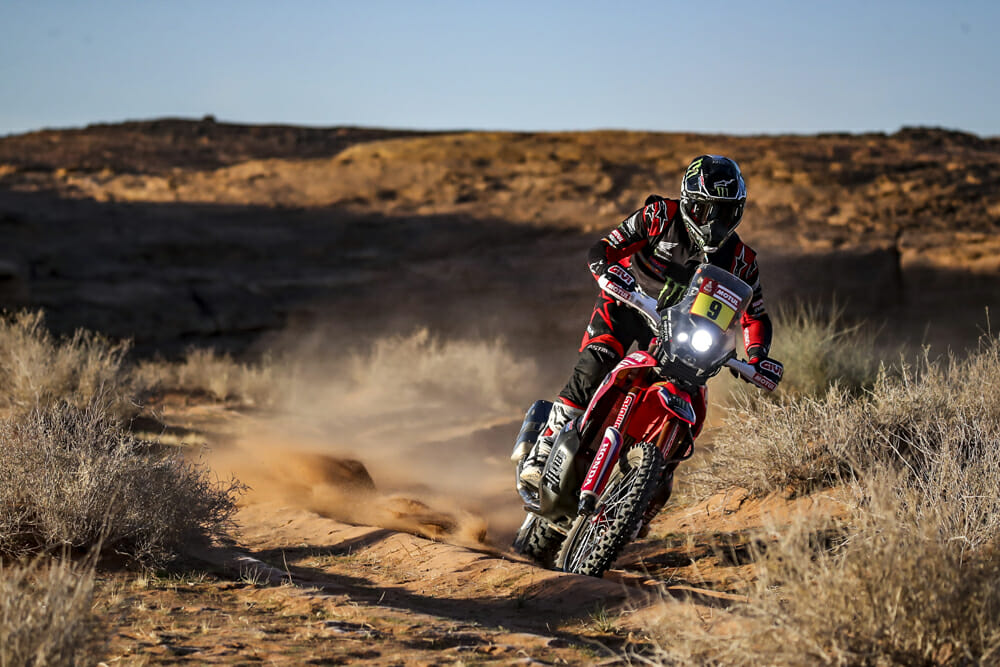 Brabec makes his way through the Saudi Arabian backcountry on stage five.
Brabec makes his way through the Saudi Arabian backcountry on stage five.
How does it feel to be the first American to win the overall at the Dakar Rally?
It feels good to be the first American. People are asking me, “you still on cloud nine?” I’m like, “nah, not really.” The day [that I won] was good, but from my point of view there’s always more to accomplish and obviously there’s another year to do this again. So, the focus is just to keep going. Obviously, it feels really good to be the first American, make some history, do it on a Honda, but we got to keep the train going. It was nice, it still is nice, but now the target is on my back. You have to really be smart.
Speaking of being smart, tell us about your strategy going into the race.
Some people have strategies but me and Johnny [Campbell], he’s my mentor, we didn’t really have a strategy. Just to get through every day. Get to the finish every day. It’s really hard to have a strategy because you don’t know what’s going to happen the next day. It’s cool to have an idea of a strategy, but we didn’t have an idea of a strategy until maybe three days from the end. Three days from the end is obviously critical, it’s getting close so you want to maintain it. Every day I was just holding myself together and just trying to not lose a lot of time and also trying not to win.
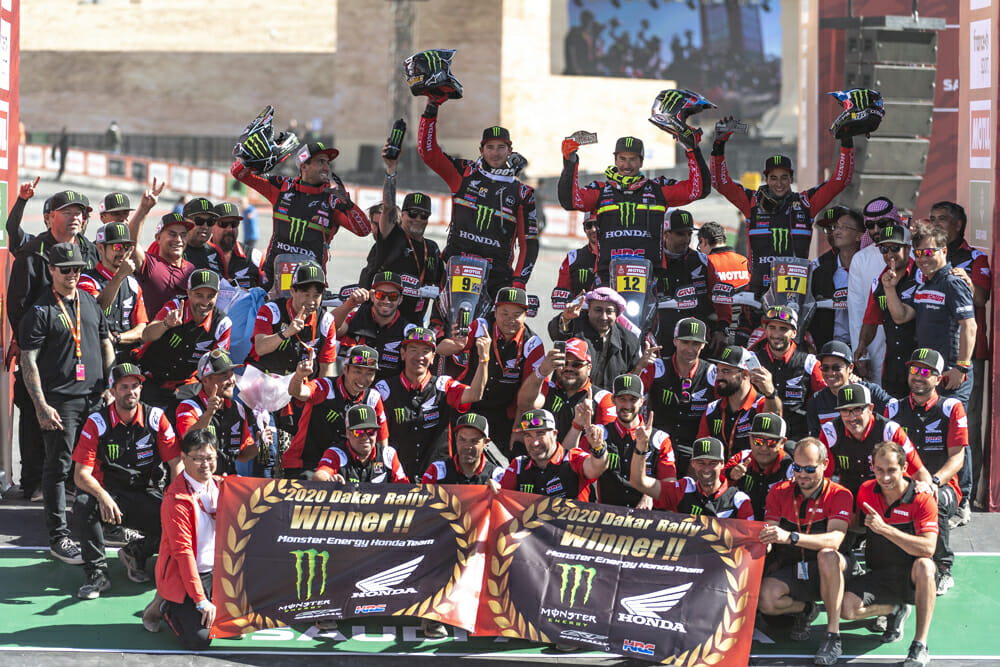 Brabec’s win marked a return to the top of the Dakar podium for Honda—a long-awaited goal for Big Red.
Brabec’s win marked a return to the top of the Dakar podium for Honda—a long-awaited goal for Big Red.
Trying not to win the stage, because then you have to open the track the next day and you become vulnerable at that point.
Exactly.
Day three is when you moved into the lead, and you really hit the throttle and put 18 minutes on the field. What was it like from that point?
After day three, obviously I won, so day four I had to open up the whole track, and it was one of the longest days. I think 570 race kilometers. So, I was really nervous. I was like, “I just made up all this time and tomorrow I’m sure I’m going to lose it.” I opened the whole day by myself. I got caught by my teammate [Ignacio Cornejo], I got caught by one person who started right behind me. On that day, I only lost eight minutes to the winner. I was still really good. I still had a 10-minute lead after day four. That day [stage three], opening the track and only losing eight minutes, I felt really confident for the rest of the rally. I didn’t have any big mistakes. The bike only fell over two times and it was in the sand dunes both times, so literally my bike had no scratches on it. It was pretty amazing.
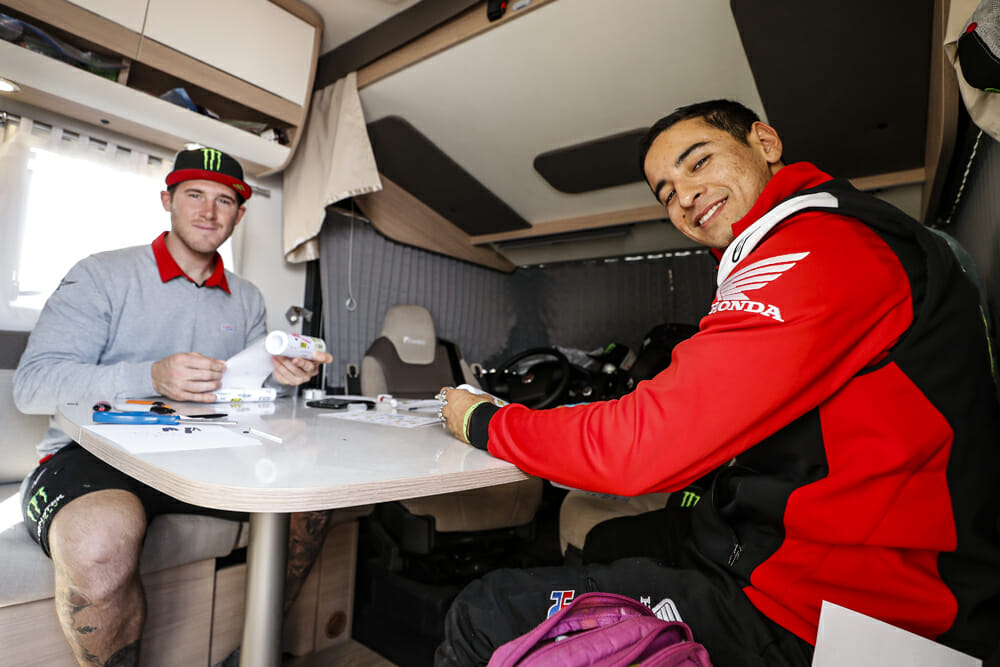 Brabec reviews the roll chart with his Monster Energy Honda teammate Nacho Cornejo.
Brabec reviews the roll chart with his Monster Energy Honda teammate Nacho Cornejo.
There’s obviously a balance between winning stages and having to open the track the next day. Explain what that means.
In rally, it’s not necessarily good to win a stage. Sometimes we lose stages by a big margin on purpose. There’s definitely a theory. If tomorrow is hard, you for sure don’t want to win today. If tomorrow is easy and fast, then you want to win today.
When people see it on TV, obviously it doesn’t look good when the guy who just won the Dakar Rally gets 11th place [on a stage]. It’s just different. It’s all time-based. The top-10 guys start three minutes apart. So, basically, if you start first and the 10th guy catches you, you just lost 30 minutes. You want to be the guy that makes up the time and not lose it.
It’s a chess game, not a sprint.
Exactly.
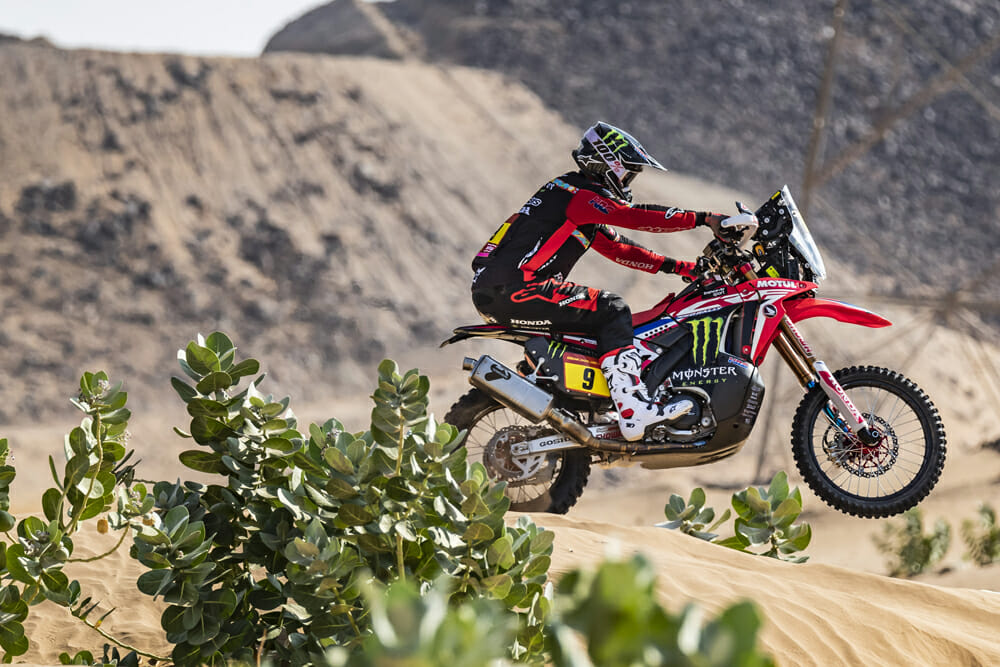 After three months of hard training in the Mojave Desert, Brabec says the Dakar Rally felt like trail riding.
After three months of hard training in the Mojave Desert, Brabec says the Dakar Rally felt like trail riding.
For you, what was the most difficult thing about the Dakar Rally?
Sleep. We probably averaged about four hours a night. You have people parked next to you working on their trucks all night, people on the side-by-sides tuning them all night, you’re not getting your seven hours of sleep. By the end of the rally you are wrecked! “Oh my, gosh, one more day! I can do it.”
How did you deal with that?
Earplugs. The only thing I wanted to do was to finish the rally and sleep without earplugs.
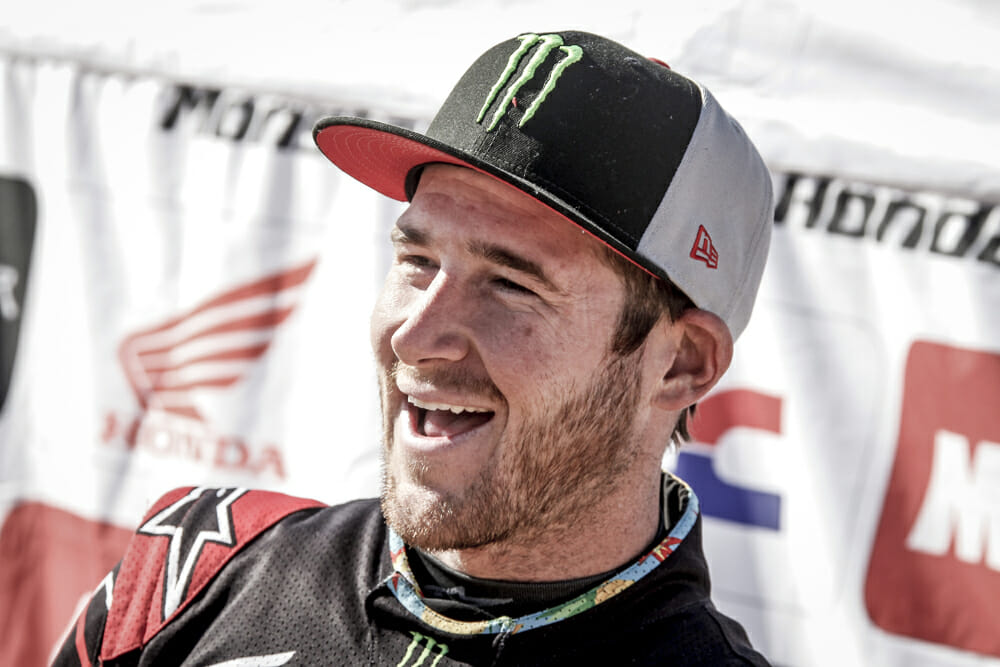 “Now that we won, we know what it takes. We’re going to do our best to go back and do it again,” says Brabec.
“Now that we won, we know what it takes. We’re going to do our best to go back and do it again,” says Brabec.
After returning home to this media whirlwind and giving interviews, do you feel that American fans understand rally?
You know, I was talking to Andy McMillin, Baja trophy truck guy. Uh, no. A lot of fans don’t understand rally. But I think they’re trying to. People don’t understand why we wake up at three in the morning. It’s like, we got to ride on the freeway to Vegas and then race. We can’t put our bikes on a vehicle and sleep. It’s definitely a different style of racing. It’s not high intensity. It’s a long duration, and it’s a relaxed duration, basically. Out here, you go to a National Hare & Hound, you go to a National Enduro, you go to a supercross or endurocross, the intensity level of endurocross and supercross is insane! They’re at their spiked heart rate for 20 minutes at a time. In rally, you never even hit your spiked heart rate. You’re just at a constant 140-160 heart rate for nine hours. You have to really be relaxed in the rally. If your heart rate is spiked at a rally, I wouldn’t say that’s good. Because if your heart rate is at 180, and then you get lost, and now you’re freaking out on top of a high heart rate, that’s going to cause you to make so many more mistakes. Where realistically, if you get lost, you need to take a deep breath, get your heart rate down, relax and then just trying to focus on getting back to where you were.
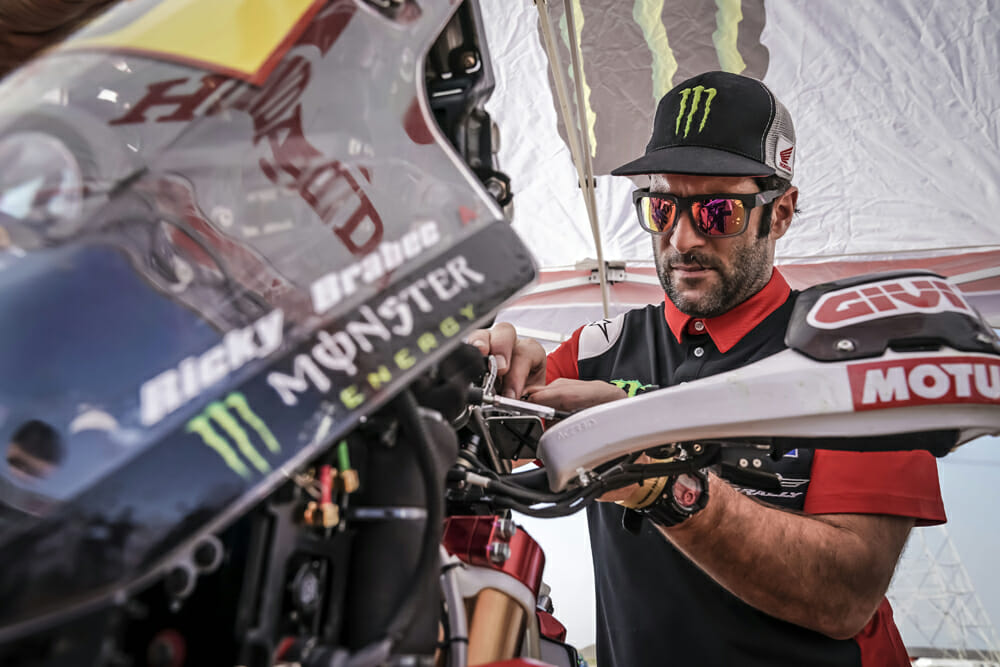 Kendall Norman prepares Brabec’s CRF450 Rally for another day of Dakar.
Kendall Norman prepares Brabec’s CRF450 Rally for another day of Dakar.
Speaking of National Hare & Hounds and AMA District 37, that’s what you grew up doing; how does that translate to the rally experience?
District 37 is a lot of reading terrain and rally is also a lot of reading terrain. And District 37 is marked with flags and dangers, but like I said, you can’t trust all that, so you have to read the terrain and go fast. So in rally you want to eliminate the road book by looking only at the important stuff, so you look at the odometer, direction and dangers, and if you see a double danger or triple danger or single danger, you just look down real quick, you know it’s there and you look ahead and you look for it. District is a really important part of reading terrain.
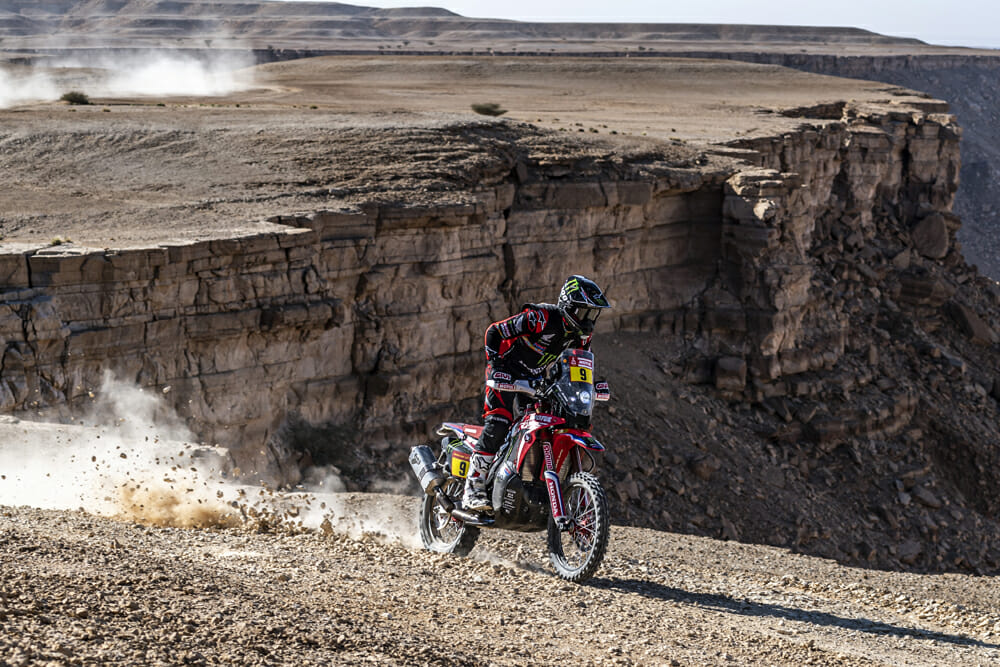 There was no shortage of stunning landscapes in the deserts of Saudi Arabia.
There was no shortage of stunning landscapes in the deserts of Saudi Arabia.
When you first started with the Honda rally team, they kept saying you took to rally “like a duck to water.” Would you say that navigation is something that came naturally to you?
The navigation did not come naturally. That stuff is so hard! I’m not a perfectionist at navigating or a perfectionist at riding dirt bikes. There’s always going to be someone better, but I learn literally something new about navigating every time I train or every time I go to a rally. Things are always advancing, things are always getting harder or better, so I’m no perfectionist. But it’s definitely not natural. I don’t think it’s natural for anybody.
As for the road books, they changed up the format a little by giving them to racers in the morning instead of the night before, which you commented you prefer.
I think getting the road book in the morning is badass! It gives us way more time to relax after the stage and nobody has information on the next day. It’s equal for everybody. So, I really hope in the near future that’s just how it goes. We all have this same road book, so it’s definitely fair.
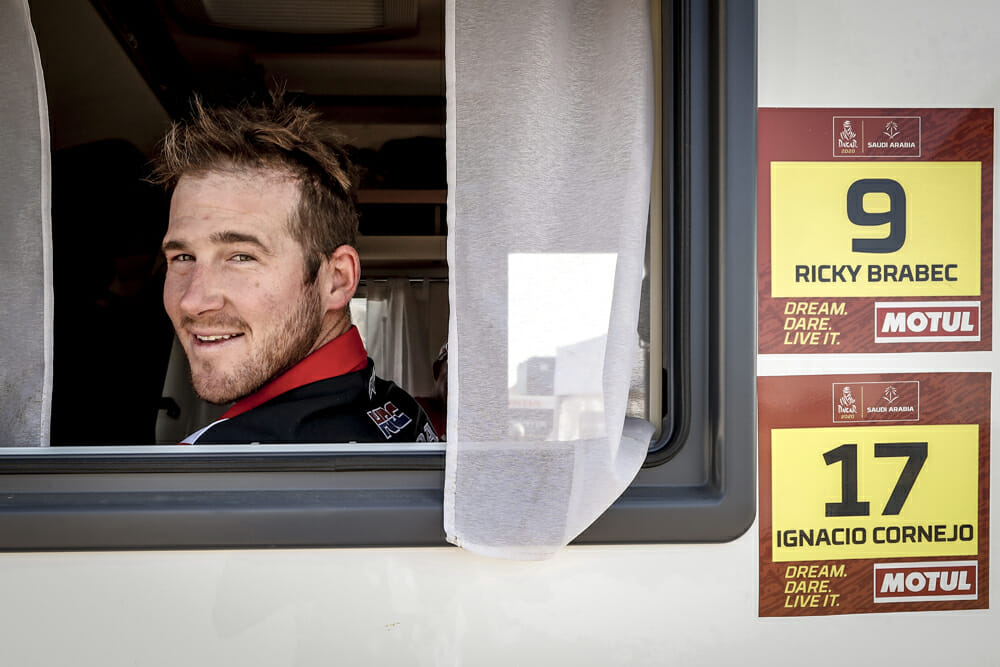 Brabec is one of only 15 riders in history to win the Dakar Rally on a motorcycle.
Brabec is one of only 15 riders in history to win the Dakar Rally on a motorcycle.
It seemed like having a new location in Saudi Arabia this year also helped equalize the field. Do you think that was a big factor?
Going to Saudi was definitely an equal playing field just because no one had inside information on the country or on the route. We were in South America so much that people were going over there and like driving around and checking things out before the rally even went there, because they just heard information on where it was going. Saudi Arabia is definitely off limits, so it makes it more like an equal playing field, like if you were going to go race a National Hare & Hound in some state that you’d never been to. No one knows what the terrain’s like, no one knows what’s around this mountain or that valley. It’s all new to us. It’s more or less like blind racing. It’s more raw, I guess.
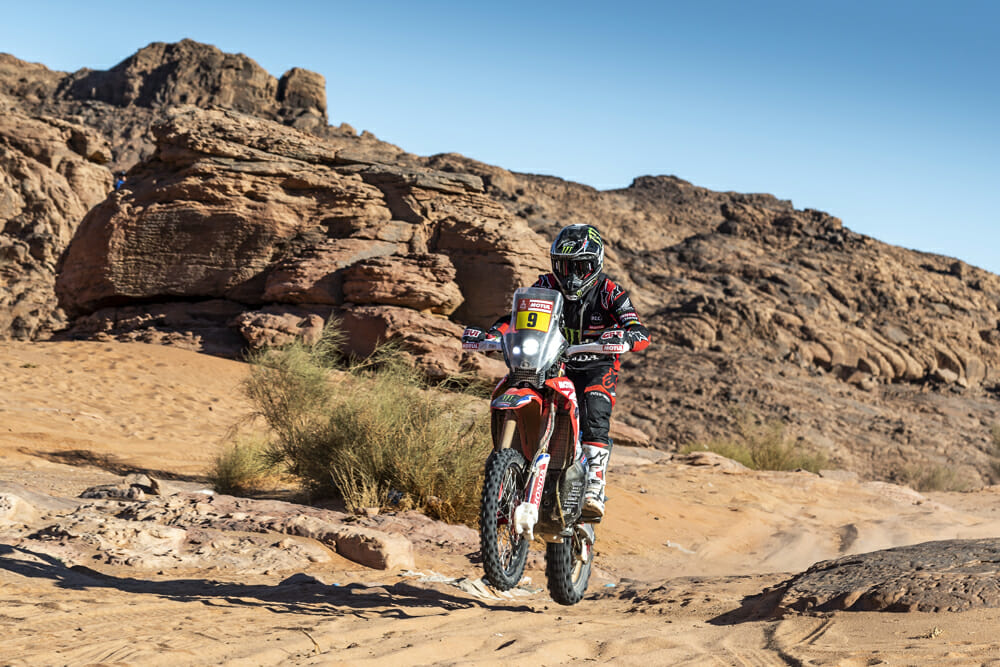 The rally’s new location in Saudi Arabia helped to equalize the field, according to Brabec.
The rally’s new location in Saudi Arabia helped to equalize the field, according to Brabec.
Talk about your training and preparation for this year. You said Jimmy Lewis (former Dakar racer) “kicked your ass every day for three months” prior to the Dakar Rally.
The rally seemed easy for me and I believe that’s because the training. I spent three days a week, three road books a week training in the Mojave Desert with Jimmy. I didn’t even go to the gym that much because I was just living in the desert and putting in the work from sun-up to sundown. I was getting irritated almost every day with Jimmy. I was pissed off. I wasn’t even confident before the rally, because I felt like Jimmy and Johnny ran me into the ground. But after the first couple days [of the race] I was like, “Oh wow.” On the third day, I gave it everything and made up like 18 minutes. Everything flowed so good, and it just felt like it was way too easy. Like I was just trail riding.
Cyril Despres (five-time Dakar Rally winner) pointed out that you’re now a member of an extremely elite group. Only 14 other people in history have ever won the Dakar Rally, and most of them have won it multiple times. It seems that once you have the recipe for victory, the wins will keep coming. Is that your hope?
Yeah, I think my year is going to be a bit easier so I’m excited about that. Because the years before, you work so hard to try to find out how to win, and now that we won, we know exactly what to do to win. I guess the thinking is going to be easier because now we have it all written down on paper what we need to do to make it happen. I’m really excited for that. Now I can start my program exactly where I left off instead of finding all these different ways to try to make it happen. Now that we won, we know what it takes. We’re going to do our best to go back and do it again.CN
